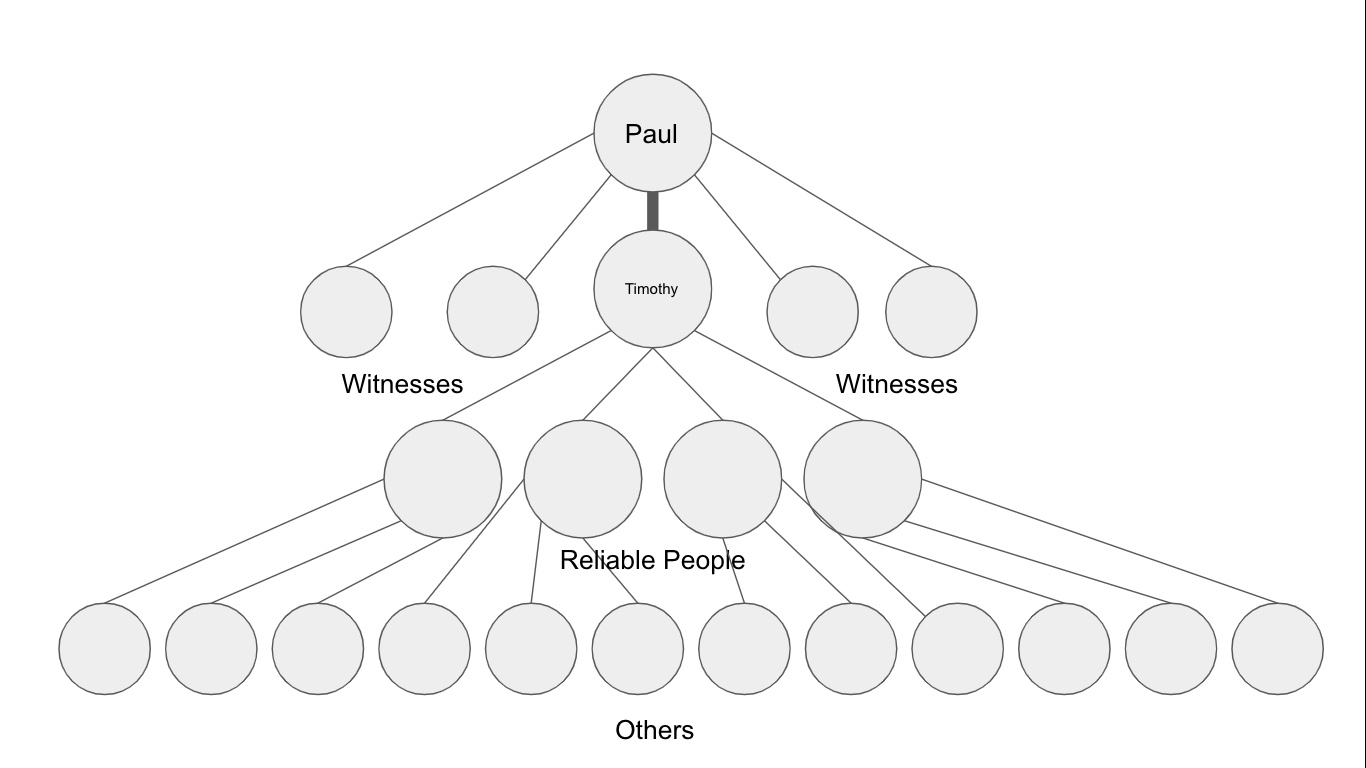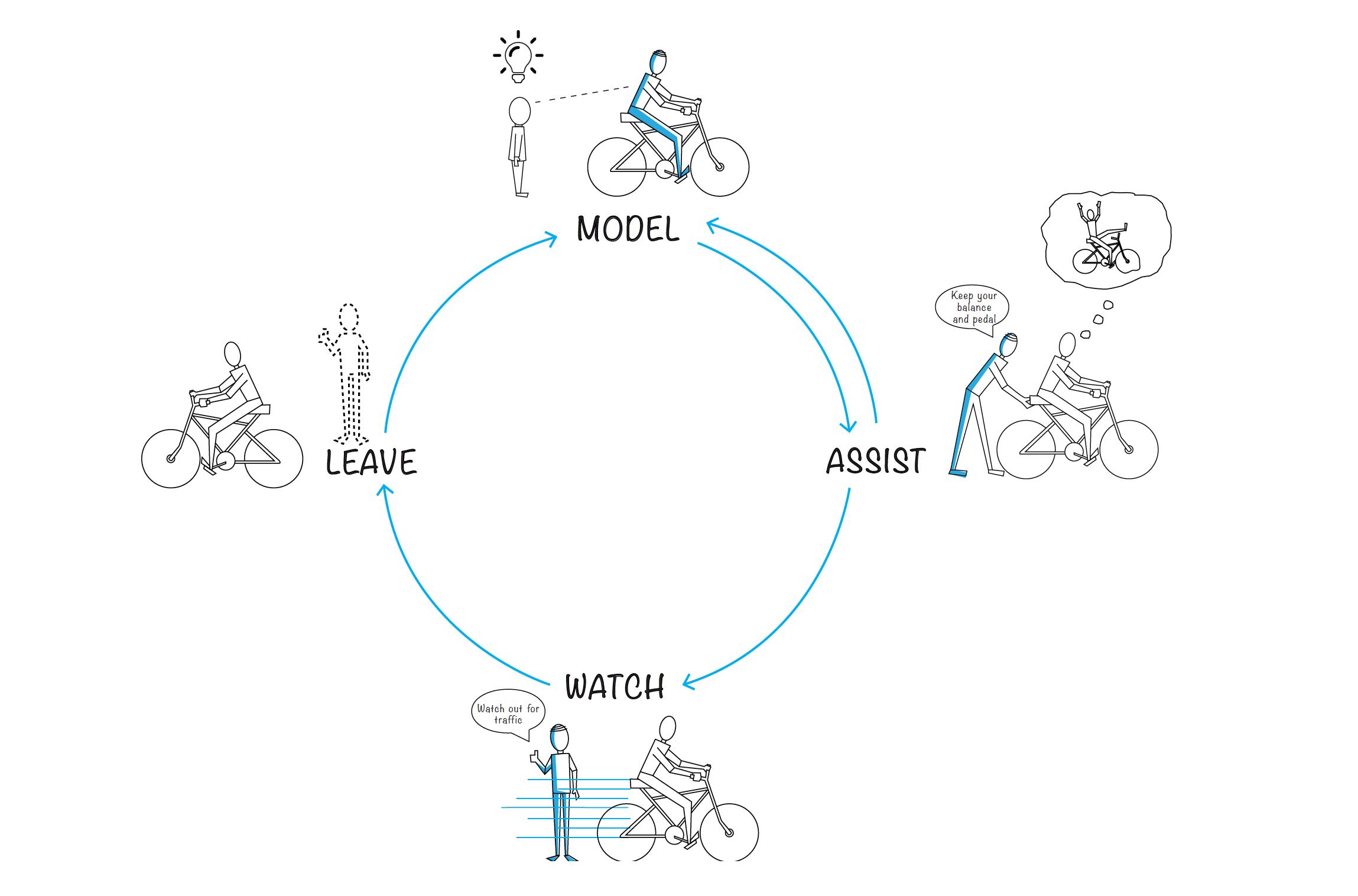Training Leaders

You now know how to get started in your first steps to make disciples. The apostle Paul said this to Timothy:
And the things you have heard me say in the presence of many witnesses entrust to reliable people who will also be qualified to teach others.
2 Timothy 2:2
Question: How many generations of disciples does Paul mention in this one verse?
Discuss this question together as a group. Draw a map of the disciples listed in this verse and then click on this box and read the answer below.
Paul mentions four generations of disciples in this one verse:
Paul is the first generation disciple of Jesus.
Timothy, along with the witnesses are the next generation of disciples.
The reliable people are the third generation.
And then the “others” are the fourth generation.

Question: What would change about the way that we teach if we also expected our disciples to teach other people to follow Jesus, who will also teach other people to the fourth generation and beyond?
Discuss this question together as a group and then click on this box and read the answer below.
There may be several things that we could change if we expected our disciples to teach others:
First, we might teach Biblical concepts in a simple way so that others might easily understand them and easily reproduce the teaching, regardless of their educational background.
Second, we could expect our disciples to put into action the lessons that they have learned from the Bible. By putting the lesson into action, they not only learn it more deeply themselves, but they also demonstrate actions that they can invite other people to join.
And third, we could not only expect that our disciples are teaching others, but we can confirm with them that they are actually doing it. Jesus calls all of his disciples to be his witnesses and make disciples, so each person should both be willing and equipped to do these things. The disciple’s correct attitude is to be willing. Our job is to equip them and help them as they do it!
The Training Cycle

We can see the training cycle, also known as the MAWL cycle – Model, Assist, Watch, and Leave – in action by both Jesus and by Paul in the New Testament. They modeled what it meant to live in the Kingdom of God, but they also brought their disciples with them, helping them to learn to do what they had been doing, then leaving them to continue on without them.
The Zume Training website has an excellent video on training others, using a process called the Training Cycle. In this case, they use a simple example of riding a bicycle. Go watch the video and then return to answer the following questions as a group:
Question: When are some times that you can think of when Jesus and Paul used the training cycle to make disciples who would be able to make disciples of other people?
Discuss this question together as a group and then click on this box and read the answer below.
Jesus
One example of Jesus training his disciples is in the Gospel of Mark, chapters 3 through 6.
First, in chapter 3, we see that Jesus chooses his disciples.
Then, in chapter 4, he begins to teach them, explaining to them how the Kingdom of God works.
At the end of chapter 4, Jesus tells them that it is time to go and he takes them to the other side of the lake, to the side of the Gentiles, where Jewish men (especially teachers!) should not go. Jesus is modeling to them and showing them how to do the work of making disciples, even, in chapter 5, sending the demoniac off to make disciples in the Decapolis.
Finally in chapter 6, we see that Jesus sends his disciples out, telling them to do the same things that he had done, calling people to repentance and driving out demons and other impure spirits.
Paul
If we look at the apostle Paul, we see an example of him training his disciples.
In Acts 19, we see that Paul baptizes several disciples who knew about John’s baptism and they receive the Holy Spirit.
Paul then takes the disciples with him and preaches in the synagogue for three months.
But when the Jews become obstinate, Paul leaves the synagogue and takes the disciples with him. At that point, he begins to teach them in the lecture hall of Tyrannus, the result of which is that all of the people, both the Jews and the Greeks hear the Word of the Lord in the province of Asia.
How did that happen? We don’t see that Paul travelled any further in Asia. Instead, we believe that Paul modeled and taught his disciples to make disciples and then sent them out to do the same thing! We see that all of the people heard the Word of the Lord, and, beside the church in Ephesus, eight new churches are planted in the province of Asia!
Question: How could Ephesians 4:11-13 connect to the training process that we are learning about here?
Discuss this question together as a group and then click on this box and read the answer below.
This is what Paul said:
So Christ himself gave the apostles, the prophets, the evangelists, the pastors and teachers, to equip his people for works of service, so that the body of Christ may be built up until we all reach unity in the faith and in the knowledge of the Son of God and become mature, attaining to the whole measure of the fullness of Christ.
Ephesians 4:11-13
Paul says that Jesus gave these gifts, the apostles, the prophets, the evangelists, the pastors, and the teachers to the church to *equip* his people for works of service.
But what are they equipping the people to do? They are equipping them to use the gifts that they have. They are equipping them to grow in maturity, in fullness of Christ.
If we use the example from the video about the Training Cycle, we could say that in the same way that someone who knows how to ride a bicycle can teach someone else to ride a bicycle, someone who has the gift of apostleship should teach others how to grow in this gifting. Or someone who has gifts in teaching should teach others to teach. In this way, the body of Christ grows together as one, becoming unified and mature in the full measure of Christ-likeness.
Question: We do not frequently see this type of equipping within the Body of Christ today. What are some of the things that prevent us from training and equipping the Body of Christ to grow and become fully mature as the scripture describes?
Discuss this question together as a group and then click on this box and read the answer below.
There are many things that can prevent us from making disciples or training and equipping as the Bible describes. A few of these may be:
- We feel that we must maintain our programs which replaces or removes time that we could use discipling others.
- We are unwilling to spend the time necessary with a person to help them grow to the level necessary.
- We are concerned about the other person’s ability to appropriately handle the training or gifting.
- We want our programs to grow, not help grow the programs led by other people in other places.
There are possibly many other reasons. Please carefully consider the things that could prevent discipleship, training, and equipping in your context and situation.